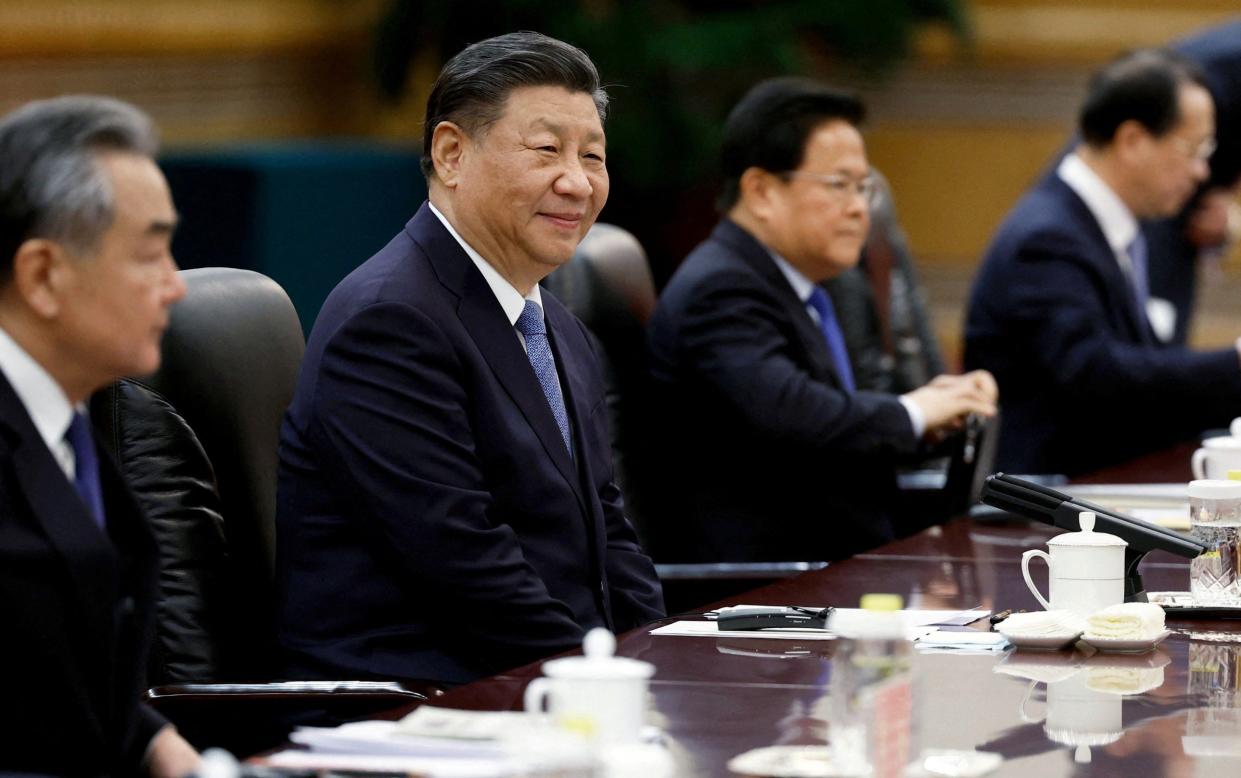China is an insidious threat – not even our stamps are safe

- Oops!Something went wrong.Please try again later.
It is becoming increasingly obvious that the Chinese Communist Party (CCP) is a malign actor intent on destabilising the West.
From Xi Jinping’s alliance with Vladimir Putin and support for his war in Ukraine to China’s cyber-attacks on Parliament and the Electoral Commission, from the export of electric vehicles to interference in elections, Beijing is flexing its muscles in ways that make it not merely a disruptor but a most insidious threat.
Now, we learn, not even our postage stamps are safe from China’s interference.
The revelation that China is behind the scourge of counterfeit stamps flooding the market in Britain is the latest example of what has been described as “economic warfare” conducted with the CCP’s “tacit approval”.
The factories printing counterfeit stamps in Shanghai, Shenzhen and Quanzhou are aiming to rob British businesses of revenue and undermine consumer confidence, sowing the seeds of distrust among the British public in the reliability of the Royal Mail.
The Post Office brand has already been tarnished by the Horizon computer scandal, and risks being further damaged by the CCP’s criminality. Perhaps that is Beijing’s intention – and it means that no institution or corporation is safe.
Beijing’s tentacles have a long reach. Last summer, the House of Commons Intelligence and Security Committee (ISC) said that China had penetrated “every sector” of the UK economy in a “whole of state” assault to which the Government’s response has been “completely inadequate”. Without swift, decisive action, we face a “nightmare scenario” where China could pose “an existential threat” to liberal democracy.
The ISC is being proven right – and the Government’s response is still too slow and too weak. Its feeble sanctions against two Chinese individuals and a company accused of hacking Parliament and the Electoral Commission was rightly described by Sir Iain Duncan Smith MP as akin to “an elephant giving birth to a mouse”.
SNP MP Stewart McDonald said the Government had turned up to “a gunfight with a wooden spoon”.
Our universities are still far too dependent on Chinese funding, compromising academic freedom and freedom of expression on UK campuses as a result.
Security cameras made by Chinese companies such as Hikvision are still widely used across Britain.
And while the Government has taken some steps, such as banning Huawei from our 5G telecommunications network, removing Chinese surveillance cameras from sensitive government sites and prohibiting the use of TikTok on government phones, it has done nothing to stop government employees, including ministers, having TikTok on their personal phones – leaving them vulnerable.
New technologies, in particular cellular IoT modules in so much of our day-to-day equipment – from watches, light bulbs and cars to healthcare equipment, security cameras and satellite systems – could be weaponised, as China expert Charles Parton and the Coalition on Secure Technology have warned.
In a small way, I myself have been a target of Beijing’s interference.
I have received dozens of anonymous, threatening letters sent to my private home address, postmarked and stamped from Hong Kong. The first, which arrived in 2018 and was sent to all my neighbours too, carried a photograph of me and the words “watch him”.
My mother, who lives in a different part of the country, already received letters asking her to tell her son to “shut up”. I have often wondered how the sender obtained my address and my mother’s, and had the resources to post letters to my whole street too.
I have also been subjected to impersonation attempts, with fake email and Twitter accounts established using my name, bio and photograph, but disseminating comments which I would never make.
In 2017 I was removed from the Conservative Party Candidates List, with little explanation, shortly after being publicly denied entry to Hong Kong on the orders of Beijing. I subsequently learned that around that time the then-Chinese ambassador had telephoned the then-chairman of the Conservative Party about me.
It is time to wake up to the scale of the threat – and take action. Fake stamps require a robust response, with tough, targeted, meaningful sanctions.
It is no good the Prime Minister categorising China as an “epoch-defining challenge”. When not even Royal Mail stamps with the monarch’s image can be trusted, it is time to recognise the regime in Beijing for what it is: an extremely grave and malicious threat to our economy, security and liberty – and conduct a wholesale re-think of our China policy.

Benedict Rogers is co-founder and Chief Executive of Hong Kong Watch, Deputy Chair of the Conservative Party Human Rights Commission and author of The China Nexus: Thirty Years In and Around the Chinese Communist Party’s Tyranny

